Conducting Research on Muslims in the Age of Dichotomies: Ethics, Politics and Responsibilities
Conducting Research on Muslims in the Age of Dichotomies: Ethics, Politics and Responsibilities
Author(s): Ahmet Erdi Öztürk, Deina AbdelkaderSubject(s): Ethics / Practical Philosophy, Islam studies, Politics and religion
Published by: Transnational Press London
Keywords: Islam; research; authoritarianism; politics; ethics;
Summary/Abstract: Global politics has always existed in an environment brimming with intricacies and transformations. Wars, natural disasters and treaties have both directly and indirectly impacted the state of global politics in addition to societies and individuals. These interactions certainly influence the flow of history while concurrently dictating the relationships between societies. Identity and its constitutive elements have consistently occupied a determinant position in this context and continue to do so (Gellner 1987; Gurses and Ozturk 2020; Douglas 2003; Daniel 2017). And pre-eminent among these and, no doubt, one of the most primal codes of identity is religion (Lybarger 2018; Ozturk 2021; Cassese and Holman 2017). Contrary to arguments that the world is becoming secularised, and that secularisation is an inevitable phenomenon, religion has persistently once more that it is more durable relative to various other normative values, and it persistently emphasises its presence in individuals, societies and politics (Saeed 2017; Fox 2019; Haynes and Wilson 2019). This indicates that religion will maintain this degree of influence for a very long time. We have both witnessed numerous incidents in which religion was a central element and, it seems, will continue to observe myriad instances demonstrating religion’s influence as an auxiliary actor.
Journal: International Journal of Religion
- Issue Year: 2/2021
- Issue No: 1
- Page Range: 3-9
- Page Count: 7
- Language: English

